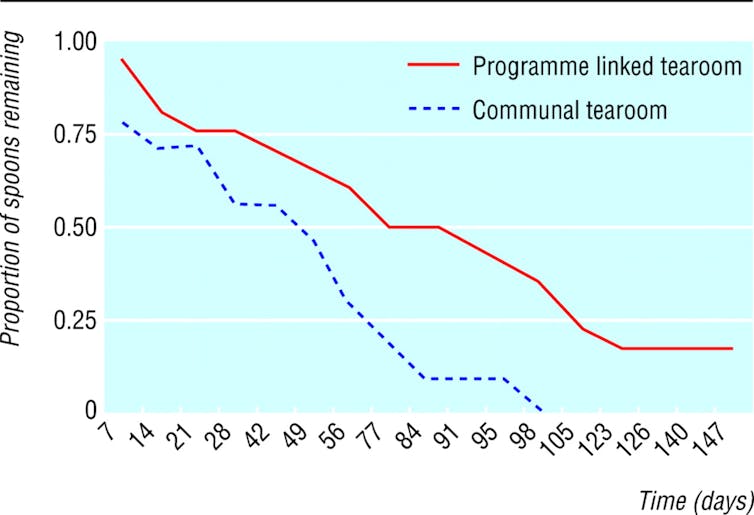The curious case of the missing workplace teaspoons
- Written by Peta King, PhD candidate, South Australian Health & Medical Research Institute
Welcome to the series This is research, where we ask academics to share and discuss open access articles that reveal important aspects of science. Today’s analysis looks at a fun piece of research, a unique longitudinal study – and explores what this type of research can and can’t tell you.
Once upon a time, a group of disheartened scientists found their tearoom bereft of teaspoons. Despite dispatching a research assistant to go purchase more – so sugar could be stirred and coffee dispensed – the newly purchased teaspoons disappeared within a few short months.
Exasperated by the disappearance, the scientists decided they would measure the phenomenon. Do the teaspoons really disappear over time?
The answer was a resounding yes: spoons in research institute tearooms seem to have legs. While good fun, the research is a good example of a study design referred to as “longitudinal”.
Read more: How do we decide which disease to prevent next? Long-term studies help
What is a longitudinal study?
A longitudinal study uses continuous or repeated measures to follow particular individuals – in this case, teaspoons – over prolonged periods of time.
The studies are generally observational in nature: the scientists simply watch and collect data over time. Typically, no external influence is applied during the course of the study.
Beyond just working out where all the teaspoons have gone, this study type is also useful for evaluating the relationship between risk factors and the development of disease (for example, heart disease), and the outcomes of treatments over different lengths of time.
Tracking teaspoons
In this study, the main questions posed by our researchers were to determine the overall rate of loss of teaspoons, and to work out how long it took for teaspoons to go missing.
They purchased 70 teaspoons (16 of which were of higher quality), each one discretely numbered and then distributed throughout the institute. Counts of the teaspoons were carried out weekly for two months, then fortnightly for a further three months. Desktops and other immediately visible surfaces were also scanned for “misplaced” spoons.
After five months of covert research, the study was revealed to the institute, and staff were asked to return or anonymously report any marked teaspoons which may have found their way into desk draws or homes.
Good study design
This type of data collection provides a simple example of what makes a good longitudinal study.
If we break it down, a longitudinal study needs to:
- take place over a prolonged period (this study was done over 5 months)
- be observational in nature (teaspoons were observed and counted, there was no intervention)
- conducted without external influences (teaspoon users/thieves were not aware they were being studied until the conclusion of the study itself).
Read more: I've always wondered: why does lemon juice lighten the colour of tea?
What did the data say?
The results show that 56 (80%) of the 70 teaspoons disappeared during the study, and that the half life of the teaspoons was 81 days (that is, half had disappeared permanently after that time).
The study also showed the half life of teaspoons in communal tearooms (42 days) was significantly shorter than for those in research group specific tearooms (77 days). The rate of loss was not influenced by the teaspoons’ value.
 Teaspoons disappear faster from communal tearooms than tearooms linked with specific research programs in a research building.
Megan Lim and coauthors (BMJ), CC BY
Teaspoons disappear faster from communal tearooms than tearooms linked with specific research programs in a research building.
Megan Lim and coauthors (BMJ), CC BY
All of these pieces of information directly answer the main question posed by the researchers.
What the study can’t say
A longitudinal study is terrific at following individuals or teaspoons over a period of time and observing outcomes. But, by definition, the design means there can be no intervention (as we are just observing a phenomenon).
The researchers could not employ a tool or an intervention to prevent spoons from being “misplaced”, and the researchers could only report a spoon missing. As the study is observational only, there is no way of finding out what has happened to the spoon, just that it is lost.
The authors were able to conclude that the loss of workplace teaspoons was rapid, and their availability in the tearoom was constantly under threat.
Perhaps you should think about bringing your own teaspoon to work, and keeping it in your pocket.
The open access research paper for this analysis is The case of the disappearing teaspoons: longitudinal cohort study of the displacement of teaspoons in an Australian research institute.
Authors: Peta King, PhD candidate, South Australian Health & Medical Research Institute
Read more http://theconversation.com/the-curious-case-of-the-missing-workplace-teaspoons-103989



















